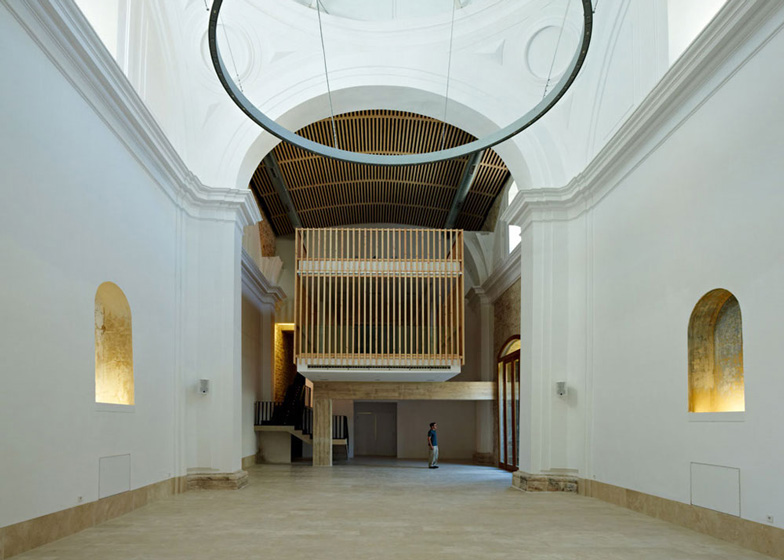Madrid studio Adam Bresnick Architects has revived the sixteenth-century interior of a chapel in Spain by reinstating a vaulted ceiling and building a timber-clad box that hovers above the floor.
Located in the small town of Brihuega, the former chapel was redesigned by American-born architect Adam Bresnick for use as a multi-purpose events space that can accommodate different community activities, or function as a wedding venue.
The main intervention is the addition of the new two-storey timber volume, which cantilevers into the space above the entrance lobby to create a modern alternative to the chapel's former choir box.
The structure only makes contact with one original wall, as the design team didn't want it to overpower the existing architecture. "The philosophy guiding the intervention was to respect time's passing," they said.
Glass balustrades surround the two suspended floors, but the entire volume is also clad with vertical pine slats that define its outline whilst allowing sound and light to pass between.
An original vaulted ceiling above had crumbled away, so was replaced with a matching construction of timber slats.
The chapel's former nave is the building's largest space. It sits below a domed ceiling, and is lit by a suspended fixture that mimics the ceiling's size and circular shape.
On the opposite side of the lobby, a new four-storey structure was inserted to accommodate ancillary functions including toilets, staff areas, a kitchen and an elevator. A staircase also extends back into this space.
A beige marble floor runs through the interior. The team also restored the building's exterior by repointing the stone walls, repairing tiled eaves and retaining original stone mouldings.
Here's a project description from the architect:
Restoration and adaptation of a 16th century chapel in Brihuega, Spain
The chapel rehabilitation is for a new typology - a multi-purpose space for events ranging from a formal wedding to the mellow ambiance of a yoga retreat. The reconstruction involved resolving the complex pathologies suffered by the original structure since being abandoned in 1969.
Adam Bresnick Architects studied and restored the existing architecture as well as inserting new uses. The philosophy guiding the intervention was to respect time's passing. From the exterior the stone facades were repointed, traditional tile eaves restored and stone mouldings left with their worn faults, including the original scarred Serlian entrance. In the interior three distinct areas are articulated, the refurbished dome where the original space is restored, the entrance into the nave is a mix of archaeological remains and new construction cantilevered over the space, minimally touching the original.
The fallen vaults that once covered this space are recalled by a new vaulted ceiling of pine slats. Plaster mouldings cutout over the bare masonry of the original wall also mark the shapes of the original vaults. The last third occupying the old choir area houses all modern uses, from the elevator allowing for handicapped access to all levels, to restrooms, kitchen, staff and storage areas. This four-story structure is inserted within the stone walls, a skylight in the stair accentuating its conceptual separation from the original container.
The materials used are the same as the original; beige marble main floor, white paint on the plaster mouldings, pine slats on the ceiling and to enclose the modern choir that floats within the volume of the nave.
The creation of new uses for historical spaces, and new employment possibilities in the context of rural Spain is an outstanding contribution to European culture. The innovation of the initiative has been recognised by the FADETA (Federación de Asociaciones para el Desarrollo Territorial del Tajo-Tajuña), a local program forming part of European Union FEADER (Fonds Européen Agricole pour le Développement Rural) program. The total construction cost is €852,000, and is privately funded. Nevertheless the quality of the intervention and its novelty has been awarded a subsidy of €200,000 by FADETA.
Principal architect: Adam Bresnick
Team architects: Miguel Peña Martínez-Conde & Antonio Romeo Donlo
Structural engineers: Juan F. de la Torre Calvo & Ana Fernández-Cuartero Paramio
Archaeologist: Olga Vallespín Gómez
Construction coordinator: Joaquín Fernández González
Clerk of the works: Federico Vega Ortega
Industrial engineering: José de Andres Abad
Contractor: José Lucas Hernández
Foreman: Alberto Martínez Gamboa
Steel structure: Mariano del Olmo
Marble: Incom Pastor
Carpentry: Hermanos Esteban
Electricity: Tabernero de Andres
Circular chandelier: Ecoaneva

